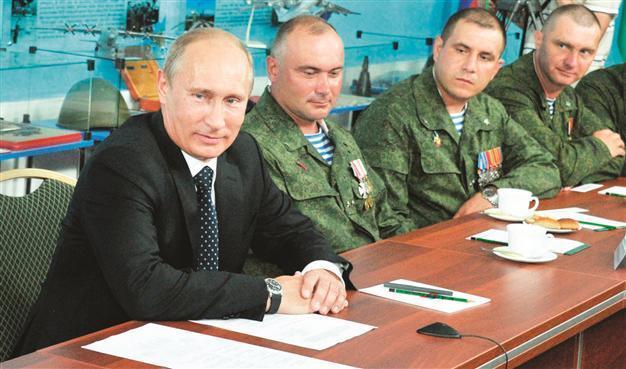Putin regrets NATO’s plan on pullout in Afghanistan
MOSCOW

Russia President Vladimir Putin (L) is seen during his visit to the Russian airborne assault brigade in Ulyanovsk. AP photo
Russian President Vladimir Putin said that Russia is supporting the NATO mission in Afghanistan by providing a transit hub and isn’t happy about the alliance’s planned withdrawal on Aug. 1.Putin was asked about the transit facility on a visit to a military airborne unit in the same Ulyanovsk region. Turning to an officer asking the question, he asked in turn: “Do we need to fight there?” and went on saying that the success of NATO’s mission is essential for maintaining stability on Russia’s southern flanks.
“Let them stay there and fight,” he said of NATO, according to the Associated Press. “That answers our national interests.” Putin also voiced regret about the planned withdrawal of most NATO combat forces by 2014, saying the alliance should complete its mission to stabilize the situation in Afghanistan. “It’s a pity that practically all the participants of the mission in Afghanistan are now thinking about getting out of there,” he said. “They have taken up that heavy burden and must carry it until the end.”
‘NATO: Cold War relic’
Moscow has provided the U.S. and other NATO member states with air corridors and railway routes for carrying supplies to and from landlocked Afghanistan.
Under a new deal this year, Russia for the first time allowed alliance members to set up a logistics facility for troops and cargo on its soil, in the Volga River city of Ulyanovsk. That move has drawn strong criticism from Communists and some other opposition groups, who assailed the Kremlin for letting troops from Moscow’s Cold War foe onto Russian soil.
Putin described NATO as a Cold War relic, but added that Moscow is ready to continue to cooperate with the alliance in other spheres, including fighting terrorism and international crime and sea piracy.
Relations between Russia, the U.S. and NATO have soured over U.S.-led NATO missile defense plan that Washington says is aimed at deflecting a potential Iranian threat. Moscow fears it will eventually become powerful enough to undermine Russia’s nuclear deterrent.
















